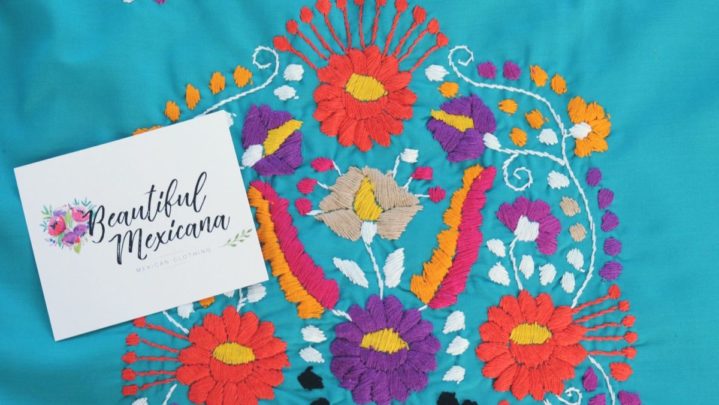
Building a Fair Trade Clothing Brand in St. Louis: Meet Beautiful Mexicana
When you hear the word "fair trade", you might immediately think of the Guatemalan coffee from your favorite hipster coffee chain or tomato farmers; in reality, the scope is much larger. Fair trade encompasses the entire supply chain from getting the product made by the original producer to shipping it to a store, and into placing it in the hands of the final consumer.
Writing by Tiffany Chimal. Tiffany Chimal is the co-founder and COO of MakersValley, an online platform that connects designers & boutiques with Italian apparel manufacturers and is democratizing the manufacturing industry. Follow MakersValley on Instagram (@makersvalley) and Twitter (@askmakersvalley) for the most up to date information on what’s happening in the fashion industry.
Fabiola Pasquel Chalini runs Beautiful Mexicana, a sustainable women’s clothing brand 100% handmade by artisans in Mexico. Chalini moved to St. Louis from Mexico with dreams of bringing the art she sees in Mexican textiles to American culture. Beyond that, she’s also made it her brand’s mission to support fair trade and develop a certification for Mexican artisans here in the United States.
Power in Beauty
Her decision to launch Beautiful Mexicana came from her love of her Mexican roots and her country.
Chalini’s dresses and blouses have earned popularity at the St. Louis Tower Grove Park Market. Some of the brightly colored, intricately embroidered Mexican tops and dresses even stand on display now at the Missouri History Museum.
The rich craftsmanship in Mexican textiles showcases the beautiful side of her business. The powerful side lies in the extraordinary level of trust she has built with her four suppliers in Mexico and the Fair Trade certification process she wants to complete for her growing startup.
“My goal is to get a Fair Trade certification for Mexican artisans here in the United States,” Chalini stated during our meeting.
What is Fair Trade Clothing and Why Does it Matter?
We delved into how fair trade works in the fashion industry. Chalini explained that it takes a lot of work to become a Fair Trade business, but that she is focused on meeting all requirements for certification.
Although a fair trade partnership is not a legal requirement for businesses, according to Fair Trade USA, a non-profit based in Oakland, California, a growing 1,250+ businesses are Fair Trade partners and see sustainable fashion as a key retail strategy. Some of our favorite clothing brands carry Fair Trade Certified apparel, including Patagonia, Athleta, and prAna.
Brands and traders can become Fair Trade partners by using fair trade certification to support the producers in their supply chain. As a fashion brand, this means working only with Fair Trade certified suppliers, registering your business on the Fair Trade USA website, and working with your Fair Trade USA account manager to get your product and packaging approved and correctly stamped with the Fair Trade label.
Fair Trade USA does not actually certify companies or businesses, but instead partners with businesses to certify individual products, facilities, and producer groups. Fair Trade USA certified products fall into five main categories:
- Apparel & Home Goods
- Coffee
- Produce & Floral
- Seafood
- Consumer Packaged Goods
When a fashion brand becomes a Fair Trade partner, it means that for every Fair Trade Certified product sold, the business selling it pays money into a Community Development Fund, which goes directly back to the community of origin.
In Chalini’s business, this includes Oaxaca, a region in central Mexico. The Oaxaca community decides together how to spend the Community Development Fund to improve their lives and meet their unique social, economic, and environmental needs.
For example, a portion of Chalini’s sales assisted recovery and rebuilding efforts in Oaxaca, after a major earthquake hit Mexico in September 2017.
Sourcing Handmade Apparel from Artisans
Chalini works with four suppliers in Mexico who operate as a cooperative of artisans. To some extent, this has made finding consistency across her product offerings a challenge.
“When I started my business, I was looking for artisans in Mexico to import their clothing and my mother was going to the markets in Oaxaca, but the quality in the products we were finding was inconsistent. When you run a business, you need some consistency, that’s why I want to look at Fair trade certification,” explained Chalini.
However, when her mother attempted sourcing at the local Oaxaca markets, she could not find the same product offerings in the right quantities and colors needed to scale her business.
“In Northern Mexico, that is the exception, because the fashions of the northern states are not special to that state, but as you go further south in Mexico, you start to see in middle and southern Mexico the particular embroideries that you can trace back to a specific region of artisans.”
Each region of Mexico has a unique sewing technique and style of embroidery. Such distinct styles mean that, by only seeing the embroidery of a piece, she can determine the region of Mexico in which the apparel was created, Chalini asserted.
“The artisans in Mexico use traditional techniques they’ve learned over the decades in their communities. For example, some products I source from Chiapas which is well known for its textiles woven with a traditional technique, on back strap looms, by the indigenous people.”
By becoming a Fair Trade partner and guiding her entire supplier base using sustainable business principles, Chalini could be heading in the right direction to make her product offerings more consistent through fair trade.
When working with her suppliers now, she picks the colors and then her suppliers show her which products are available before she imports them to St. Louis.
As her business grows, the amount of product she imports will increase. She is always looking for ways to support Mexican artisans in their communities through her expansion of product offerings. For example, Chalini has introduced wallets into her product line.
Her plan is to build a high level of trust with her four suppliers now so that she can scale her business and eventually achieve her goal of Fair Trade certification for Mexican artisans here in the United States.
I love Chalini’s mission! My company, MakersValley, shares her vision ofcreating a sustainable fashion industry that supports local community. We help improve the lives of Italian artisans by allowing them to have access to customers across the globe and set fair prices for quality products, created at factory price for designers and boutiques, via our online platform.






